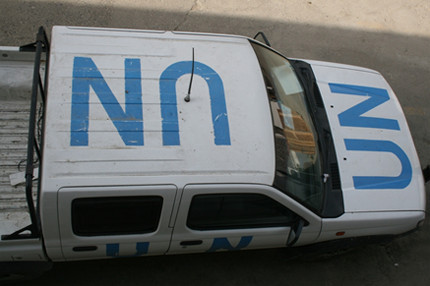International Agencies Call For Temporary Exit From Afghanistan
An armoured UN vehicle in Afghanistan

NEW DELHI: Following the upsurge in violence carried out by Taliban militants in Afghanistan the past month, several international aid agencies based in Kabul have decided to pull out their staff from the troubled country.
Agencies however, as reported in The New York Times, emphasised that they were determined to keep working in the country despite the security threat, and that these pull outs, where instituted, were temporary.
Afghanistan remains the deadliest country in the world to be an aid worker, with 95 of the 229 aid workers killed or injured worldwide so far this, being in Afghanistan. That said, this year has seen a decrease in aid worker death in Afghanistan. So far in 2014, 36 aid workers have been killed and 95 wounded throughout Afghanistan; in 2013, 44 aid workers were killed and 167 wounded in the country.
However, the worry amongst international aid agencies is linked to the upsurge in violence targeting foreign workers and security forces, with the Taliban stepping up attacks in the past month.
A day ago, a suicide bomber detonated his payload at a crowded funeral, killing two police and seven civilians. A few days before that, in the most recent attack targeting foreigners, Taliban gunmen killed three members of a South African family in an attack on a foreign guesthouse in Kabul-- the third such attack on a foreign guesthouse within a span of 10 days.
Less than a week ago, just hours after gunmen attacked a British convoy that killed six people and injured 35 others in the capital city, a suicide bomber breached the defenses of a guest house belonging to the International Relief & Development (IRD) organization.
At the same time, in Helmand province, fighting began on Thursday and continued till Sunday as a dozen plus Taliban insurgents stormed Camp Bastion. At least five soldiers were killed. Adding to the bloodshed, in another part of Helmand -- in Sangin district -- at least 12 soldiers were killed after their smaller outpost was attacked by gunmen.
On Tuesday last week, a roadside bomb exploded in Kabul injuring seven Afghan National Army personnel. On the same day, a bombing on the Pakistan-Afghanistan border, which officials blamed on the Haqqani network, killed sixty-one and injured fifty others.
Earlier last week, a suicide bomber detonated his vest packed with explosives at amid a crowd of people who had gathered to watch a volleyball match, killing 45 in the attack in Afghanistan’s Paktika province.
The attack coincided with an agreement reached in Afghanistan’s parliament, on the same day, that allowed for US and NATO troops to remain in the country post 2014.
The week before, two days after Taliban fighters killed two security guards on the eastern outskirts of Kabul, officials say that they killed four Taliban suicide bombers during an attack on a compound housing foreign workers in the capital city.
A few weeks before, a convoy of vehicles belonging to American-led coalition forces was attacked twice by Taliban gunmen. Although the convoy suffered no casualties, an Afghan civilian died in the attack. A few days before that in the same week, two separate bombings killed at least ten police officers, including a top commander. The bombings, in turn, followed an attack on the police headquarters in Kabul a day earlier that killed a senior police officer and injured six others. The explosion reportedly happened two hours after another explosion in Kabul, with news reports from the region quoting Defence Ministry Spokesman Mohammad Zahair Azimi saying that the earlier attack was on an Afghan army vehicle that resulted in no casualties.
Earlier, in October, six police officers and two civilians were killed in two separate attacks on the same day, a day after members of the Taliban ambushed a police convoy, leading to an hours-long gun battle in northern Afghanistan. Before that, in the same month, Taliban insurgents killed 22 security force members in Sar-e-Pol province north of Kabul, which in turn, followed a bomb in Kabul on the same day that killed one civilian.
A few weeks ago, although not claimed by the Taliban, a prominent female politician -- Shukria Barakzai -- narrowly escaped a suicide attack that killed three others.
Other recent attacks -- leading up to and during the Presidential elections -- include an attack that killed three soldiers belonging to the United States-led International Security Assistance Force (ISAF) in September, a suicide bombing that killed Karzai’s cousin Hashmat Khalil Karzai, the shooting of 15 civilians, two Finnish relief workers, an attack on the Kabul airport, and one of the deadliest attacks since 2001 wherein a sports utility vehicle detonated in a busy market in Paktika province, eastern Afghanistan, that killed 90 people.



